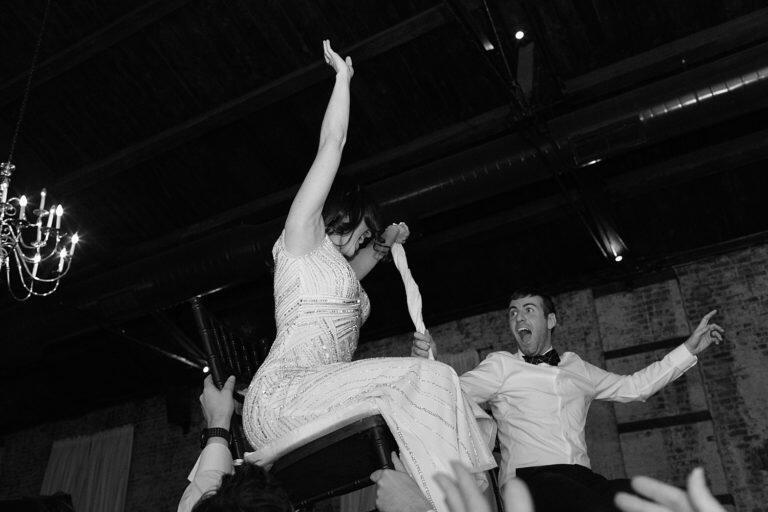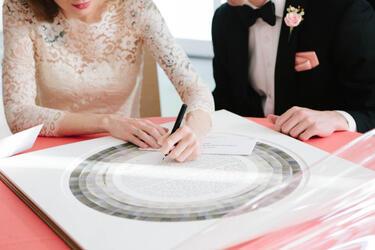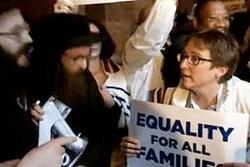Getting Married during a Pandemic: Interview with 'A Practical Wedding' Founder, Meg Keene
In late February, my partner Max and I got engaged. The first few weeks were spent in a haze of excitement and anxiety: Suddenly, everyone I’d ever met wanted my opinion on wedding themes (theme?) dress styles (whatever doesn’t break the bank) and changing my last name (not happening). By mid-March, those minor crises had disappeared into the ether, and rightfully so; the novel coronavirus had made short work of upending our lives as we previously knew them.
There was a tinge of quiet, guilty relief in the virus’s probable long-term effects on the wedding industry: Neither Max nor I had ever dreamed of anything resembling a “traditional” American wedding, and I imagined us eloping, rather than planning (and possibly postponing or canceling) a pricey celebration. The impulse to simply elope and forgo any sort of community celebration comes from a place of valid fear and general apprehension about the best use of money and time at this moment. But it would also mean forgoing some of the elements of a wedding that we do love—bringing our community together, affirming our commitment to each other in front of the people who made us who we are, and breaking the glass under a chuppah we built together. And so we’re in a holding pattern: not putting down non-refundable deposits, but quietly kicking off a countdown app to the date we hope might belong to us.
A few weeks into sheltering-in-place, a dear friend (someone whose own 2020 wedding has been overhauled to accommodate social distancing) mailed me a copy of A Practical Wedding by Meg Keene. To date, the book (and apracticalwedding.com) have been virtually the only wedding-related media I’ve consumed consistently. APW is feminist, queer-inclusive, DIY-friendly, and, perhaps most importantly, aggressively honest. This has proven to be especially valuable in the time of COVID: While other wedding websites were cheerfully encouraging June and July 2020 couples to hold off on making decisions about their 150-person weddings as states locked down until further notice, APW pivoted immediately to helping couples adjust their expectations, navigate recoup losses, and re-arranging plans.
My friend sent me A Practical Wedding in part because she felt the planning advice was rock-solid, but also because Meg Keene is Jewish, and discusses crafting a Jewish celebration with her now-husband at length in the book. I reached out to Keene a few weeks ago to chat about Jewish weddings in the United States, gendered wedding traditions, and what might happen to the wedding industry after COVID—a particularly pertinent topic for this moment. You can read excerpts from our conversation below, or read the full interview.
On weddings in the time of COVID-19
Keene: There's still this idea that you're going to have a small wedding, and then you're going to have the big wedding later...it's not like suddenly we’ll be able to do three years’ worth of weddings, and people will be able to afford to travel to them.
I have been thinking a lot about people that are doing these rushed weddings and saying, “We're saving the fun stuff for the real wedding.” They're saying they don't want to get a dress, or they don’t want to have a photographer, or flowers. And my point is not about spending money—you should do whatever you’d like in that regard. But I'm worried that people aren’t coming to terms with the possibility that their “actual wedding” is going to be when they went to City Hall or when they had something on Zoom. Because life is going to move on. So I just have concern about people rushing through it because they don't want to make it special, not realizing that this is in fact going to be part of their story.
On how COVID-19 is uniquely affecting Jewish weddings and community gatherings
Orlovsky-Schnitzler: One of my pre-written questions was, “how are Jewish weddings uniquely being affected by this crisis?” And it is certainly dependent on affiliation to some degree, especially in terms of looking at what sized community you're incorporating into your celebration.
Keene: Right—like for many Orthodox Jews, 200 people would be a small wedding.
Orlovsky-Schnitzler: Totally. And this got me thinking about the situation with [Bill] de Blasio a few weeks ago—that was in relation to a funeral. But I saw an article linked on Facebook that I thought was very profound about the condemnation of mass gatherings during this lockdown. And to be very clear—I’m not Orthodox, and of course it was a public health hazard for these folks to gather in a massive group. But the article raised an interesting question about how Orthodox Jews live their faith and express their membership in their community—a faith and community that we all, as Jews, regardless of our level of observance, claim to be a part of. For those folks in Brooklyn who had this mass funeral gathering, there simply doesn’t exist another way to mark that life cycle event. It’s inconceivable.
Keene: I’ve been thinking and talking a lot about this idea—even before the pandemic—that Judaism is really about the Talmud more than it’s about the Torah in some really profound ways, especially rabbinic Judaism. The Talmud is a series of laws. And even as a conservative-leaning reform Jew, I feel like I have a responsibility to engage with those laws even if I choose not to follow them. Judaism is not a religion that's easy. Judaism is not there to make you more comfortable or approve of you. It's demanding and rigorous. And so I feel like I have to be in relationship to those laws. As my rabbi taught me to say, I don't keep kosher—yet.
But to flip back to weddings, the community is an internal part of the Jewish wedding. And I just don’t know how having a Jewish wedding on Zoom would work. I just keep coming back to that question, because even the symbolism of the chuppah is bound up in demonstrating openness to the community. All the symbolism, all of the activities. Bringing joy to the couple, having witnesses for your ketubah. The rituals are not built with the idea that they could be done in a solitary way. And so how do you manage that?
On Jewish wedding traditions
Orlovsky-Schnitzler: I'm a grad student studying folklore. And, as you can imagine, I think a lot about tradition and what it means contextually for different people at different moments in their lives. There's the colloquial definition of tradition and then there's the living tradition that we grapple with that means something different for everybody. And with all of that in mind—when you think of a Jewish wedding, what are the elements that, to you, make it Jewish? What is traditional for you? And I recognize, again, that it’s different for every affiliation, and background—and that much of what is considered “traditional” is pretty Ashkenazi-based.
Keene: I think broadly speaking, I would say: the breaking of the glass, and the seven blessings. I can't remember, which is silly of me, but I can’t remember when during my ceremony the glasses of wine were drunk. It seems critical! But anyway, the two glasses of wine, and we signed a ketubah. We did not do a bedecken. We did one for our ten year anniversary. We did this huge, over-the-top 10 year anniversary party. And we did that, largely, because we had just been through all of these funerals. And we needed a positive way to get people together. Now, I am so glad we had that celebration. But yeah, the wine and the glass and the chuppah and the ketubah were the key elements for me. And then, of course, the community. How do you do any of things without community?
On Gender, the Wedding Industry, and Bridal Parties
Orlovsky-Schnitzler: The final question I have is about some of the quasi-gendered aspects of the American wedding and how they might be affected by this pandemic… I mean, for years there have been think pieces about how crazy it is that culturally we got to the point where people were spending a thousand dollars to be in a bridal party was considered average. How could you ask that of your friends now?
Keene: I mean, it just doesn't make any sense. Practically speaking, the bridal party isn’t going to happen for a long time because right now it can’t. You can't have those people sharing space with you. If you're having a virtual wedding, or a wedding with ten people, maybe you'll have a maid of honor and a best man. I also think bachelorette parties are done for a while—they’re all about getting together with your girlfriends, having a fun weekend, drinking and going out. Doesn't really translate well on Zoom. If you're going to do something virtually, the bridal shower at least translates a bit—presents can be mailed, and opened live for folks. So yeah, I think bachelorette parties are going to disappear for at least for a while. Bachelor parties along with them…and in terms of bridal parties, I worry about what will happen to the industry if they aren’t happening for months and months in any meaningful way. And there are so many amazing women out there who have spent years fighting through all of the sexism to build really successful businesses that are around, like, bridesmaids dresses. What happens if that totally disappears?
Orlovsky-Schnitzler: And I think that’s really important for this question overall, because it's very easy to paint things with a broad brush and say, “it's not feminist to have X thing” or “it's not feminist to have bridesmaids,” but it's more nuanced than that.
Keene: The other side of this is that it is largely women and women-identified people running these businesses and remaking these spaces. That’s been the push in the last 10 years. I think aside from organizations like The Knot, you know, the really big guns, the wedding industry is almost entirely small, women-owned businesses. And a lot of them are women of color. Almost no business can withstand money stopping. And that's basically what's happening in the wedding industry right now, and parts of it will disappear entirely.








